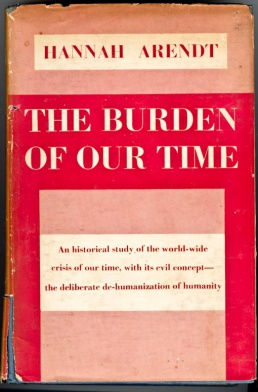Hannah Arendt
Johanna "Hannah" Arendt (14 October 1906 – 4 December 1975) was a German-American political theorist and social philosopher.
Contents
Biography
Hannah Arendt was born in 1906 in Hanover. In 1924, after having completed her high school studies, she went to Marburg University to study with Martin Heidegger. The encounter with Heidegger, with whom she had a brief but intense love-affair, had a lasting influence on her thought. After a year of study in Marburg, she moved to Freiburg University where she spent one semester attending the lectures of Edmund Husserl. In the spring of 1926 she went to Heidelberg University to study with Karl Jaspers, a philosopher with whom she established a long-lasting intellectual and personal friendship. She completed her doctoral dissertation, entitled Der Liebesbegriff bei Augustin (LA) under Jaspers's supervision in 1929. She was forced to flee Germany in 1933 as a result of Hitler's rise to power, and after a brief stay in Prague and Geneva she moved to Paris where for six years (1933–39) she worked for a number of Jewish refugee organisations. In 1936 she separated from her first husband, Günther Stern, and started to live with Heinrich Blücher, whom she married in 1940. During her stay in Paris she continued to work on her biography of Rahel Varnhagen, which was not published until 1957 (RV). In 1941 she was forced to leave France and moved to New York with her husband and mother. In New York she soon became part of an influential circle of writers and intellectuals gathered around the journal Partisan Review. During the post-war period she lectured at a number of American universities, including Princeton, Berkeley and Chicago, but was most closely associated with the New School for Social Research, where she was a professor of political philosophy until her death in 1975. (Source)
Works
| Works are in English unless otherwise stated. Green and blue links point to digital versions of publications available on Monoskop or other digital libraries (sometimes using abbreviations). |
Books
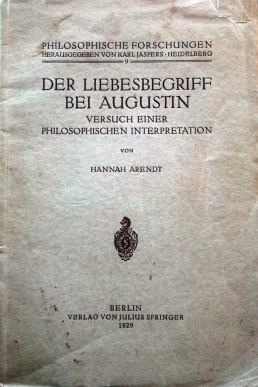
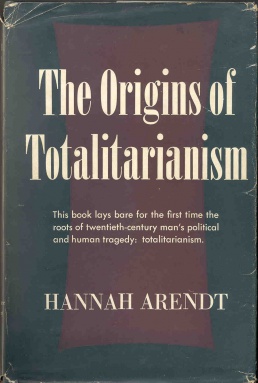


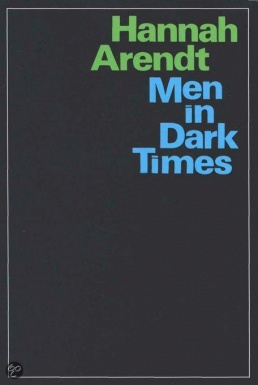

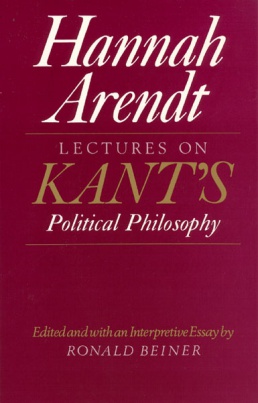
- LA, Der Liebesbegriff bei Augustin. Versuch einer philosophischen Interpretation, Berlin: Springer, 1929, 90 pp. Doctoral dissertation, PDF, PDF. (German)
- Il concetto d'amore in Agostino. Saggio di interpretazione filosofica, Milan: SE, 1992. (Italian)
- Love and St. Augustine, trans. Joanna V. Scott and Judith C. Stark, University of Chicago Press, 1996.
- Sechs Essays [Six essays], Heidelberg: Lambert Schneider, 1948. (German)
- OT, The Origins of Totalitarianism, New York: Harcourt, Brace & Co., 1951; UK ed. as The Burden of Our Time(s), London: Secker & Warburg, 1951; 2nd ed., enl., Cleveland and New York: World Publishing Co., Meridian Books, 1958; repr., 1962, PDF; 3rd ed., with new prefaces, San Diego/ New York/ London: Harcourt, Brace & World, 1966, 1968, 1973, PDF; 1976; 1979, PDF; rev.ed., New York: Schocken, 2004.
- Elemente und Ursprünge totaler Herrschaft, Frankfurt: Europäische Verlagsanstalt, 1955; 1958; 1961; 1962. (German)
- Le origini del totalitarismo, trans. Amerigo Guadagnin, Milan: Edizioni di Comunità, 1967; 1989; 1999; Milan: Bompiani, 1978; Turin: Einaudi, 2004. (Italian)
- Το Ολοκληρωτικό Σύστημα, trans. Γιάννης Λάμψας, Athens [Αθήνα]: Euryalos [Ευρύαλος], 1988, PDF, IA. (Greek)
- Origens do totalitarismo, trans. Roberto, Raposo Sao Paulo: Companhia das Letras, 1989, PDF. (Portuguese)
- Los Orígenes del Totalitarismo, trans. G. Solana, Madrid: Taurus Ediciones, 1974; 1999, PDF. (Spanish)
- Originile totalitarismului, trad. I. Dur şi M. Ivănescu, Bucharest: Humanitas, 2004; 2nd ed., 2006; 3rd ed., 2014, IA. (Romanian)
- Fragwürdige Traditionsbestände im Politischen Denken der Gegenwart, Frankfurt: Europäische Verlagsanstalt, 1957. Four essays, all included in BPF. (German)
- HC, The Human Condition, University of Chicago Press, 1958; 2nd ed., intro. Margaret Canovan, 1998, PDF.
- La condición humana, trans. Ramón Gil Novales, Barcelona: Paidós, 1974; 1993; 2003; 2005, PDF, ARG. (Spanish)
- Vita activa oder von tätigen Leben, Stuttgart: Kohlhammer, 1960; Munich: Piper, 1967. (German)
- Vita activa, Milan: Bompiani, 1964; new ed. as Vita activa. La condizione umana, Milan:, Bompiani, 1989. (Italian)
- Condiţia umană, trans. Claudiu Vereş and Gabriel Chindea, Cluj: Editura Idea Design & Print, 2007, PDF. (Romanian)
- A condição humana, trans. Roberto Raposo, 10th ed., Rio de Janeiro: Forense Universitária, 2007, IA, [1]. (Portuguese)
- İnsanlık Durumu, Istanbul: İletişim Yayıncılık, 2008. [2] (Turkish)
- RV, Rahel Varnhagen: The Life of a Jewess, trans. Richard and Clara Winston, London: East and West Library, 1958; rev.ed. as Rahel Varnhagen: The Life of a Jewish Woman, New York: Harcourt Brace Jovanovich, 1974; critical ed., ed. Liliane Weissberg, Johns Hopkins University Press, 1997.
- Rahel Varnhagen. Storia di un'ebrea, Milan: Il Saggiatore, 1988; Milan: Net, 2004. (Italian)
- Die ungarische Revolution und der totalitäre Imperialismus, trans. Charlotte Beradt, Munich: Piper, 1958. (German)
- Von der Menschlichkeit in Finsteren Zeiten: Gedanken Zu Lessing, Hamburg: Hauswedell, 1960; Munich: Piper, 1960, PDF, IA. (Later the first essay in MDT.) (German)
- Uomini in tempi oscuri: Lessing, Rosa Luxemburg, Papa Giovanni XXIII, Karen Blixen, Milan: Spano, 1968. (Italian)
- L'umanità in tempi bui. Riflessioni su Lessing, Milan: Cortina, 2006. (Italian)
- BPF, Between Past and Future: Six Exercises in Political Thought, New York: Viking Press, 1961, London: Faber & Faber, 1961, PDF; revised ed., 1968; New York: Penguin, 1993.
- Tra Passato e Futuro, trans. Tania Gargiulo, Milan: Garzanti, 1991, PDF, IA. (Italian)
- Entre el pasado y el futuro, trans. Ana Poljak, Barcelona: Península, 1996. (Spanish)
- Între trecut şi viitor. Opt exerciţii de gândire politică, trans. Louis Rinaldo Ulrich, Bucharest: Antet, [1997] n.d., PDF. (Romanian)
- EJ, Eichmann in Jerusalem: A Report on the Banality of Evil, Viking Press, 1963; rev. & enl.ed., 1965, Log.
- Eichmann in Jerusalem. Ein Bericht von der Banalität des Bösen, Munich: Piper, 1964, Log. (German)
- La banalità del male: Eichmann e Gerusalemme, trans. Piero Bernardini, Milan: Feltrinelli, 1964, Log. (Italian)
- Eichmann en Jerusalém, trans. Carlos Ribalta, Barcelona: Lumen, 1999; 2003. (Spanish)
- Eichmann la Ierusalim. Raport asupra banalitatii răului, trans. Mariana Net, Bucharest: Humanitas, 2008, 380 pp. (Romanian)
- OR, On Revolution, New York: Viking Press, 1963; Faber & Faber, 1964; 2nd ed., rev., 1965; Pelican Books, 1973; 1977; re-print, Penguin Books, 1990, PDF, PDF.
- MDT, Men in Dark Times, New York: Harcourt, Brace and World, 1968; 1970, PDF; Harmondsworth: Penguin, 1973.
- OV, On Violence, New York: Harcourt, Brace and World, 1970, PDF, Scribd.
- Sulla Violenza, trans. Aldo Chiaruttini, Milan: Arnoldo Monadatori, 1971, PDF IA. (Italian)
- Macht und Gewalt, Munich: Piper, 1975. (German)
- Περί Βίας, trans. Βάνα Νικολαΐδου-Κυριανίδου, Athens [Αθήνα]: Alexandreia [Αλεξάνδρεια], 2000, PDF,IA. (Greek)
- Sobre la violencia, trans. Guillermo Solana, Madrid: Alianza Editorial, 2005; 2006, PDF, IA. (Spanish)
- Walter Benjamin-Bertolt Brecht: Zwei Essays, Munich: Piper, 1971. Both essays included in MDT. (German)
- CR, Crises of the Republic: Lying in Politics; Civil Disobedience; On Violence; Thoughts on Politics and Revolution, Harmondsworth: Penguin, 1972, PDF, PDF; 1973.
- PP, The Promise of Politics, The University of the South, 1972, 1975, 2005, ARG.
- Wahrheit und Lüge in der Politik: Zwei Essays, Munich: Piper, 1972. The two essays, "Lying in Politics" [1971] and "Truth and Politics" [1967], first appeared in English. (German)
- Die Verborgene Tradition: Acht Essays, Frankfurt: Suhrkamp, 1976. Six of these essays appeared in 1948 as Sechs Essays, the other two are "Zionism Reconsidered" [1945] and "Aufklärung und Judenfrage" [1932]. (German)
- JP, The Jew as Pariah: Jewish Identity and Politics in the Modern Age, ed. & intro. Ron H. Feldman, New York: Grove Press, 1978.
- Ebraismo e modernità, Milan: Unicopli, 1986. (Italian)
- LM, The Life of the Mind, 2 vols. (Volume I: "Thinking", Volume II: "Willing"), ed. Mary McCarthy, New York: Harcourt Brace Jovanovich, 1978; 1981, PDF, IA.
- La vida del espíritu. El pensar, la voluntad y el juicio en la filosofía y en la política, trans. R. Montoro and F. Vallespín, Madrid: Centro de Estudios Constitucionales, 1984, PDF. (Spanish)
- La vita della mente, Milan: Il Mulino, 1987, PDF. (Italian)
- A vida do espírito, trans. Antônio Abranches and Helena Martins, Rio de Janeiro: Relume-Dumará, 1991; 2nd ed., 1992; 3rd ed., 1995; 4th ed., 2000, PDF. (Brazilian Portuguese)
- LK, Lectures on Kant's Political Philosophy, ed. Ronald Beiner, University of Chicago Press, 1992, PDF, PDF.
- Teoria del giudizio politico. Lezioni sulla filosofia politica di Kant, Genova: Il melangolo, 1990. (Italian)
- Conferencias sobre la filosofía política de Kant, trans. Ronald Beiner, Barcelona and Madrid: Paidos Iberica, 2003, PDF. (Spanish)
- EU, Essays in Understanding: 1930–1954, ed. & intro. Jerome Kohn, New York: Harcourt Brace & Company, 1994, IA.
- Critical Essays, ed. Lewis P. Hinchman and Sandra K. Hinchman, SUNY Press, 1994, PDF.
- Was ist Politik? Aus dem Nachlaß, Munich: Piper, 1995. (German)
- Denktagebuch 1950-1973, 2 vols., Munich: Piper, 2002, PDF. (German)
- Quaderni e diari, 1950-1973, Vicenza: Neri Pozza, 2007. (Italian)
- Arendt und Benjamin: Texte, Briefe, Dokumente, eds. Detlev Schöttker and Erdmut Wizisla, Suhrkamp, 2006. (German)
- Reflections on Literature and Culture, ed. & intro. Susannah Gottlieb, Stanford University Press, 2007.
Selected articles
- "Augustin und Protestantismus", Frankfurter Zeitung, no. 902 (12 April 1930).
- "We Refugees", The Menorah Journal, 1943; repr. in Altogether Elsewhere: Writers on Exile, ed. Marc Robinson, Boston: Faber and Faber, 1996, pp. 110-119, PDF.
- "Race-Thinking before Racism", The Review of Politics, Vol. 6, no 1 (Jan., 1944), pp. 36-73, PDF.
- "The Jew as Pariah: A Hidden Tradition", Jewish Social Studies, Vol. 6, No. 2 (Apr., 1944), pp. 99-122, PDF.
- "French Existentialism", The Nation, 162, no. 8 (1946): 226-28.
- "Organized Guilt and Universal Responsibility", Jewish Frontier 12, no. 1 (1945), pp. 19-23.
- "Privileged Jews", Jewish Social Studies, Vol. 8, no. 1 (Jan., 1946), pp. 3-30, PDF.
- "What Is Existenz Philosophy?", Partisan Review 13, no. 1 (1946): 34-56.
- "The Concentration Camps", Partisan Review 15, 7 (July 1948): 743-763, ARG.
- "The Achievement of Hermann Broch", The Kenyon Review, Vol. 11, No. 3 (Summer, 1949), pp. 476-483, PDF.
- "Social Science Techniques and the Study of Concentration Camps", Jewish Social Studies, Vol. 12, no 1 (Jan., 1950), pp. 49-64, PDF.
- "Religion and the Intellectuals", Partisan Review 17, no. 2 (1950): 113-16.
- "The Imperialist Character", The Review of Politics, Vol. 12, No. 3 (Jul., 1950), pp. 303-320, PDF
- "A Reply [to Voegelinl]", Review of Politics 15, no. 1 (1953): 76-84.
- "Understanding and Politics", Partisan Review 20, no. 4 (1953): 377-92.
- "Religion and Politics", Confluence 2, no. 3 (1953): 105-26.
- "The Personality of Waldemar Gurian", The Review of Politics, Vol. 17, No. 1, The Gurian Memorial Issue (Jan., 1955), pp. 33-42, PDF.
- "Totalitarian Imperialism: Reflections on the Hungarian Revolution", The Journal of Politics, Vol. 20, No. 1 (Feb., 1958), pp. 5-43, PDF.
- "The Modern Concept of History", The Review of Politics, Vol. 20, No. 4, Twentieth Anniversary Issue: I (Oct., 1958), pp. 570-590, PDF.
- "Reflections on Little Rock", Dissent 6, no. 1 (1959): 45-56.
- "Society and Culture", Daedalus, Vol. 89, no 2, Mass Culture and Mass Media (Spring, 1960), pp. 278-287, PDF.
- "Freedom and Politics" [1961], in Freedom and Serfdom, ed. Albert Hunold, Dordrecht: D. Reidel Publishing Company, 1961, pp. 191-217, ARG.
- "Personal Responsibility Under Dictatorship", Listener 72, no. 1845 (1964): 185-88.
- "Reflections on Violence", New York Review of Books, February 27, 1969, ARG.
- "Martin Heidegger at Eighty", New York Review of Books 17, no. 6 (1971): 50-54.
- "Home to Roost: A Bicentennial Address", New York Review of Books, 21, no. 11 (June 26, 1975): 2-6.
- "Thinking and Moral Considerations: A Lecture", Social Research 38, no. 3 (1971): 416-46.
- "Public Rights and Private Interests", In Small Comforts: Hard Times for Humanists, ed. Michael Mooney and Florian Stuber. Columbia University Press, 1977, pp. 103-8.
- "Philosophy and Politics", Social Research, Vol. 57, no. 1 (spring 1990), PDF
- "Some questions of moral philosophy", Social Research, Vol. 61, no 4 (Winter 1994), PDF.
- "Das Phänomen der Revolution", in Demokratische Politik. Analyse und Theorie. Politikwissenschaft in der Bundesrepublik Deutschland, ed. Wolfgang Seibel, et al., Opladen/Wiesbaden: Westdeutscher Verlag, 1997, PDF. (German)
- "The Great Tradition – I. Law and Power", Social Research, Vol 74, no 3 (Fall 2007), PDF.
- Essays in The New Yorker
Translator
- Karl Jaspers, The Great Philosophers, 2 vols., ed. & trans. Hannah Arendt and Ralph Manheim, New York: Harcourt, Brace and World, 1962 & 1966. Trans. of Die Großen Philosophen, Munich: Piper, 1957. (German)
Bibliography
Correspondence
- Hannah Arendt – Karl Jaspers: Correspondence, 1926–1969, ed. Lotte Kohler and Hans Saner, translated by Robert and Rita Kimber, New York: Harcourt Brace Jovanovich, 1992.
- Between Friends: The Correspondence of Hannah Arendt and Mary McCarthy, 1949–1975, ed. & intro. Carol Brightman. New York: Harcourt Brace & Company, 1995.
- Hannah Arendt/Kurt Blumenfeld, “... in keinen Besitz verwurzelt”: Die Korrespondenz, ed. Ingeborg Nordmann and Iris Pilling. Hamburg: Rotbuch, 1995. (German)
- Hannah Arendt/Heinrich Blücher, Briefe, 1936–1968, ed. Lotte Kohler, Munich: Piper GmbH & Co., 1996. (German)
- Hannah Arendt/Martin Heidegger, Briefe, 1925 bis 1975, ed. Ursula Ludz, Frankfurt: Vittorio Klostermann, 1998. (German)
- Within Four Walls: The Correspondence Between Hannah Arendt and Heinrich Blücher, 1936-1968, Lotte Kohler, editor, trans. Peter Constantine, New York: Harcourt Brace Publishing, 2000. Review
Literature
- R.J. Bernstein, Hannah Arendt and the Jewish Question, Cambridge University Press, 1966.
- M. Canovan, The Political Thought of Hannah Arendt, London: J. M. Dent, 1974.
- Elisabeth Young-Bruehl, Hannah Arendt: For Love of the World, Yale University Press, 1982.
- Shiraz Dossa, The Public Realm and the Public Self: The Political Theory of Hannah Arendt, Waterloo, Ontario: Wilfrid Laurier University Press, 1989, PDF.
- Dagmar Barnouw, Visible Spaces: Hannah Arendt and the German-Jewish Experience, Johns Hopkins University Press, 1990.
- Maurizio Passerin d’Entrèves, The Political Philosophy of Hannah Arendt, London and New York: Routledge, 1994, PDF.
- L. Disch, Hannah Arendt and the Limits of Philosophy, Cornell University Press, 1994.
- Elzbieta Ettinger, Hannah Arendt/Martin Heidegger, Yale University Press, 1995.
- Dana R. Villa, Arendt and Heidegger: The Fate of the Political, Princeton University Press, 1996.
- C. Calhoun, J. McGowan (eds.), Hannah Arendt and the Meaning of Politics, University of Minnesota Press, 1997.
- Elzbieta Ettinger, Hannah Arendt/Martin Heidegger, New Haven, 1997.
- Hanna Fenichel Pitkin, The Attack of the Blob: Hannah Arendt's Concept of the Social, University of Chicago Press, 1998.
- Jennifer Ring, The Political Consequences of Thinking: Gender and Judaism in the Work of Hannah Arendt, SUNY Press, 1998, PDF.
- John McGowan, Hannah Arendt. An Introduction, University of Minnesota Press, 1998, IA.
- Steven Aschheim (ed.), Hannah Arendt in Jerusalem, Berkeley, 2001.
- Dana Villa (ed.), The Cambridge companion to Hannah Arendt, Cambridge, 2001, PDF, 2006; 2010.
- R. Berkowitz with T. Keenan and J. Katz, editors, Thinking in Dark Times: Hannah Arendt on Ethics and Politics, Fordham University Press, 2009.
- Simon Swift, Hannah Arendt, London and New York: Routledge, 2009.
- P. Baehr, Hannah Arendt, Totalitarianism, and the Social Sciences, Stanford University Press, 2010.
- Anna Yeatman et al. (eds.), Action and Appearance: Ethics and the Politics of Writing in Hannah Arendt, Continuum, 2011, IA.
- Liisi Keedus, The Crisis of German Historicism: The Early Political Thought of Hannah Arendt and Leo Strauss , Cambridge University Press, 2015, PDF.
- more

